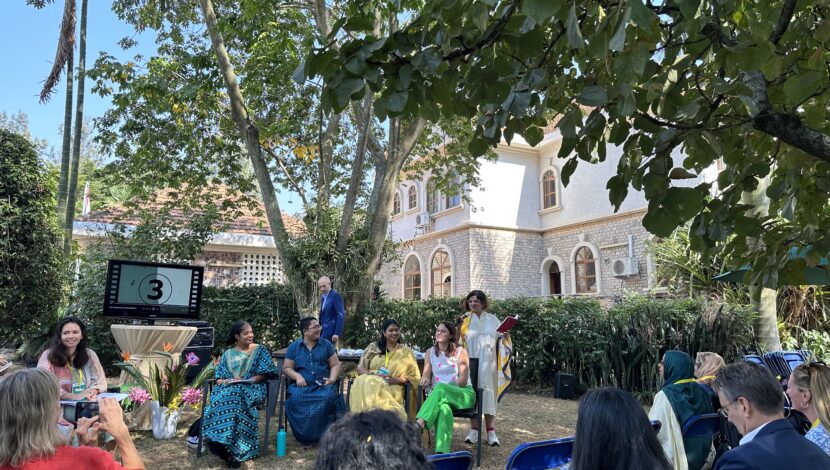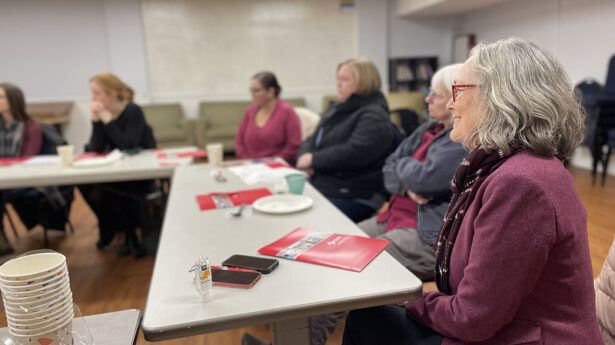The Unitarian Universalist Service Committee advances human rights through grassroots collaborations.
Resourcing Feminist Crisis Response

By on March 7, 2024
The Association for Women’s Rights in Development (AWID) has noted often how feminist movements—particularly in the Global South and East—are at the center of the political project for global gender justice. We use the term “Feminist movements” to be inclusive of women, girls, transgender, gender expansive, intersex and non-binary people globally. And we understand that Feminist movements are not just focused on equality, but are working to address the patriarchal, dominant systems, institutions and values that inhibit progress towards gender justice.
Our approach is rooted in our understanding of the feminist funding ecosystem—a dynamic, complex network of relationships and resources aimed at supporting social change through a gender justice lens. Resourcing our work with a feminist lens includes analyzing the way money is generated, distributed, and how it impacts the movements we work with. Part of our work as funders with proximity to power and resources in the feminist funder ecosystem focuses on creating space and funding for grassroots feminist power-building and to collectively amplify collective global feminist thought and practice that is necessary to fuel our movements over the long term. We have a role to play to support the enabling of feminist movements by collectively learning and strategizing on how funding actors, sectors, and resources interact and support the creation of a new and more responsive framework for resourcing action for change.
One of the ways we’ve been able to leverage our networks and collective power has been through our collaboration with many funders through the Human Rights Funders Network Crisis Preparedness work. This work includes working collectively with peace, security, and human rights funders to deliver more coordinated, effective, and efficient resources for extreme threats or crises.
In pursuit of this goal, we had the opportunity to participate in the Wilton Park dialogue on resourcing feminist movements in crisis held in the United Kingdom in early February which underscored a persistent issue: The vast majority of humanitarian and development aid does not directly reach women rights organizations. Even less goes to girls, non-binary and trans-led organizations. With only 1.25% of the $56.5 billion gender-focused overseas development assistance in 2022 reaching frontline organizations in crisis contexts, the need for creating more accessible flows of funding for frontline feminist organizations is clear.
This funding distribution problem is further compounded by the quality of available funding—often short-term and restrictive, failing to cover essential operational costs or provide comprehensive support. This reality starkly contrasts with the principles of a feminist funding ecosystem that advocates for direct, flexible, and long-term support for feminist movements more fully. Our work is cut out for us ahead to collaboratively leveraging our position to shift these practices and use collective power to influence the humanitarian and international aid systems.
We’ve also learned from our partners that how crises are defined is a highly political issue that needs to be understood within the context of different cultural, social, historic and political contests. Crises cannot be defined by those of us with privilege situated in the Global North/West. Feminist grassroots leaders are using the language of crisis, but in a different way—to describe the crises of life as they actually experience them. In accordance with this reframing, the real crisis can be seen as the crisis of racialized capitalism and exploitation itself. The crisis can be regarded as the continuation of patriarchal systems of dominance and oppression. This requires in turn understanding “crisis” not as a temporary or one-off event, or an anomaly within the dominant global system, but as a core feature of that system.
Part of our work at UUSC includes recognizing the strategic importance of bridging the gap between grassroots organizing and philanthropy. By leveraging our platform, networks and relationships, we aim not only to educate and influence, but collectively mobilize our peer funders into action, emphasizing the need for a shift towards more equitable funding models. Our development, grant making, research, and communications strategies are centered around a deep understanding of our partners’ work, their challenges, and the stakeholders they seek to influence. Through the sharing of our partners’ narratives, we aim to uplift the invaluable work being done on the ground and advocate substantial resource support from our global philanthropic peers. Furthermore, we aim to challenge the anti-gender harmful narratives that are undermining feminist movement building.
By challenging outdated funding models and by collaborating, we hope to pave the way for a future where feminist movements are fully supported in their vital work, leading to transformative changes for communities at the intersections of oppression and injustice.
Image Credit: UUSC

